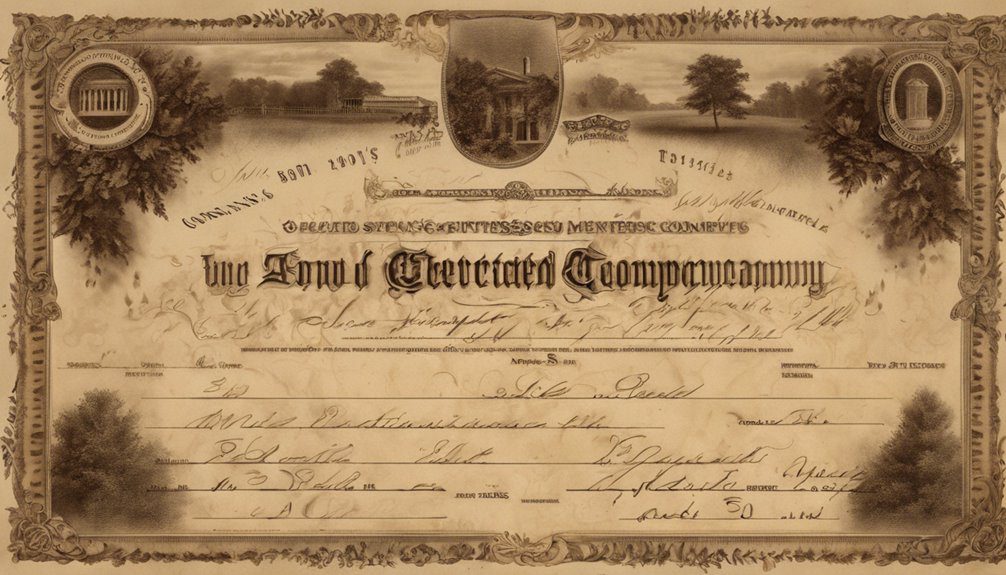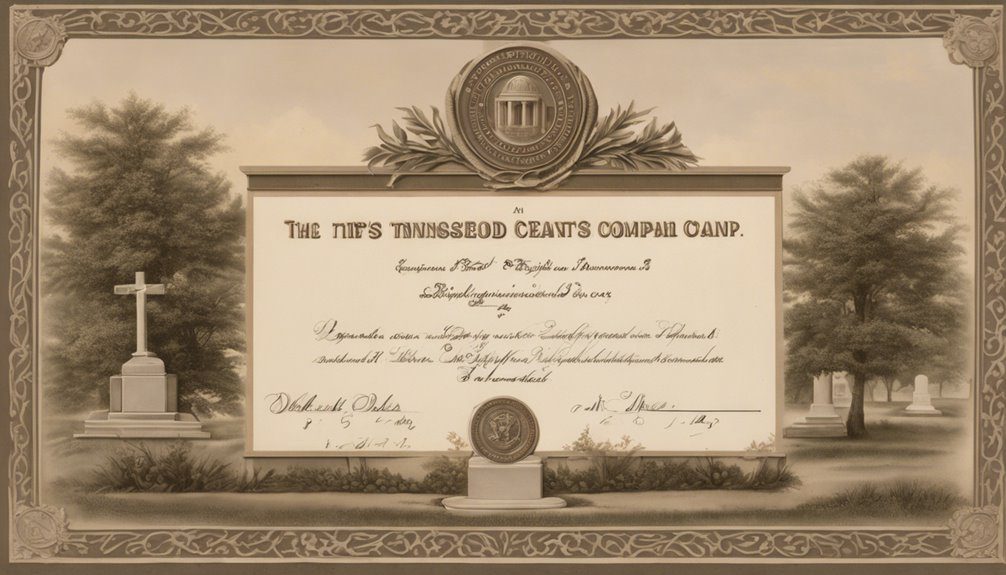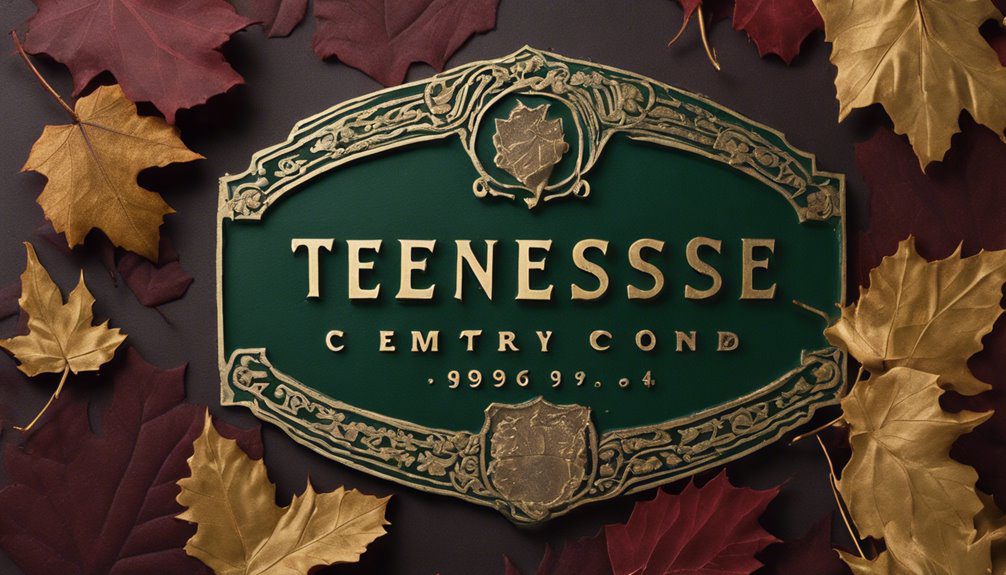When you consider the emotional weight of planning end-of-life arrangements, it's crucial to understand how the Tennessee Cemetery Company Bond protects your interests. This bond ensures that cemetery companies are held accountable, providing a safeguard against mismanagement during a vulnerable time. You might wonder about the specific protections it offers and how it impacts your choices. As we explore the requirements and implications of this bond, you'll gain insights that could influence your decisions significantly. What else does this bond entail, and how can it affect your peace of mind?
Overview of Cemetery Bonds

When considering the financial aspects of cemetery operations, understanding cemetery bonds is crucial. These bonds serve as a safety net for consumers, ensuring that funds are available for the maintenance and care of burial sites. They protect you and your loved ones by guaranteeing that your chosen cemetery will uphold its commitments.
Cemetery bonds are essentially a type of surety bond. They're often required by state regulations to ensure that cemeteries have the financial capability to fulfill their obligations. If a cemetery fails to meet its responsibilities—like maintaining the grounds or providing a grave marker—the bond can cover those costs, giving you peace of mind.
You might also find that these bonds vary in amount and type depending on the specific requirements of your state or local jurisdiction. Familiarizing yourself with these differences can help you make informed decisions when choosing a cemetery.
Importance of the Tennessee Bond
Understanding the importance of the Tennessee Cemetery Company bond is vital for anyone planning for end-of-life arrangements. This bond provides financial security and peace of mind, ensuring that your loved ones' final resting place is handled with care and respect. By requiring cemetery companies to obtain this bond, the state protects consumers against potential mismanagement or malpractice.
When you choose a cemetery, you expect them to uphold their promises regarding maintenance, burial procedures, and other essential services. The bond acts as a safety net, holding the company accountable. If they fail to meet their obligations, the bond can cover financial losses, allowing you to seek restitution.
Additionally, having this bond in place fosters trust. You can feel confident knowing that the cemetery company is committed to ethical practices and adheres to state regulations. It also signals to the community that the company values its reputation and is dedicated to serving families with integrity.
In a time of grief, you shouldn't have to worry about the reliability of the services being provided. The Tennessee Cemetery Company bond ensures that you receive the care and respect you and your loved ones deserve.
Requirements for Obtaining a Bond

To obtain a Tennessee Cemetery Company bond, you must meet several key requirements that ensure compliance with state regulations.
First, you'll need to provide proof of your business's legal structure, such as articles of incorporation or a partnership agreement. This establishes your company's legitimacy and operational framework.
Next, you'll need to demonstrate financial stability. Insurers typically evaluate your credit history and financial statements to assess your ability to fulfill your obligations. A strong credit score can enhance your chances of securing a bond and may lower your premium costs.
Additionally, you must complete a bond application, which includes personal and business information. Be prepared to disclose any past legal issues or claims against your company, as this information can impact your eligibility.
Lastly, you'll have to pay a premium, which is a percentage of the total bond amount. The premium varies based on factors like your creditworthiness and the bond amount required by the state.
Types of Cemetery Companies Covered
Tennessee's cemetery company bond covers a range of entities involved in the burial and memorialization processes. If you're part of this industry, you'll find that various types of cemetery companies are included under this bond.
For instance, traditional cemeteries that provide burial plots and services are covered, ensuring they operate within legal and ethical standards.
Additionally, crematories and mausoleums fall under this umbrella, as they also provide essential services related to memorialization.
You might be involved in a perpetual care cemetery, which requires a bond to guarantee ongoing maintenance and care for the burial grounds.
Funeral homes that offer cemetery services or work in tandem with cemeteries are also included. By having a bond, these entities demonstrate their commitment to consumer protection and financial responsibility.
Moreover, if you manage a columbarium or a burial ground for veterans, you'll need to secure this bond as well.
Understanding the types of companies covered helps you grasp the importance of compliance and consumer trust in the cemetery industry. This bond not only protects consumers but also reinforces the integrity of your business.
Bond Amounts and Pricing

Securing the right bond amount is crucial for cemetery companies to ensure compliance and protect consumers. The bond amount varies depending on several factors, including the size of your operation and the scope of services you provide. Typically, the state will specify minimum bond amounts, which you must meet to operate legally.
When determining the bond amount, consider your business's unique needs. A small cemetery might require a lower bond, while larger operations or those offering more services may need a higher bond amount. It's essential to calculate these figures accurately to avoid potential fines or penalties.
Pricing for these bonds can also vary based on your credit history, experience, and the amount of coverage needed. Generally, your premium will range from 1% to 15% of the total bond amount. If your credit score is strong, you might secure a lower premium, while poor credit could lead to higher costs.
To find the best pricing, shop around and get quotes from multiple surety bond providers. This way, you can compare rates and choose the option that fits your budget while ensuring you meet all regulatory requirements. Additionally, understanding the types of surety bonds available can help you select the appropriate bond for your specific business needs.
Consumer Protections Offered
Consumer protections play a vital role in ensuring that cemetery companies operate fairly and ethically. When you choose a cemetery service, these protections help safeguard your rights and interests.
For instance, Tennessee requires cemetery companies to obtain a surety bond, which acts as a financial guarantee. This bond ensures that funds are available to fulfill obligations, such as maintaining the cemetery or honoring pre-need agreements.
You're entitled to transparency about the services and costs involved. Cemetery companies must provide clear, written contracts outlining what you can expect. These contracts protect you from hidden fees and unexpected charges.
Plus, you have the right to cancel your agreement within a specified time frame for a full refund, which gives you peace of mind.
Additionally, if a cemetery fails to meet its obligations, you can file a claim against the bond. This means you have a recourse if you're dissatisfied with the services rendered. Claims can be made against the bond to ensure accountability and consumer protection.
Overall, these consumer protections empower you, ensuring that your investment in a cemetery is respected and that the services provided meet your expectations.
Consequences of Non-Compliance

When a cemetery company fails to comply with state regulations, it can face serious consequences that affect both its operations and its customers. You might find the company subjected to hefty fines and penalties, which can strain its financial resources. This not only impacts the company's ability to operate effectively, but it can also lead to increased costs for you, the consumer.
In addition to financial repercussions, non-compliance can result in the loss of licenses or permits necessary for operation. If a cemetery company loses its license, it may be forced to shut down, leaving families without a place to honor their loved ones. This can cause emotional distress and financial burdens for customers who've already made arrangements.
Moreover, non-compliance may lead to legal actions, including lawsuits from affected customers. If you're left with unsatisfactory services or misplaced funds, you could seek compensation, further complicating the company's struggles.
Ultimately, the consequences of non-compliance extend beyond the company itself, impacting the trust and peace of mind that you deserve when making arrangements for your loved ones.
How to Apply for a Bond
Applying for a bond can seem daunting, but breaking it down into manageable steps makes the process easier.
First, identify the specific type of bond you need— in this case, a Tennessee Cemetery Company Bond.
Next, gather the necessary documentation, which typically includes your business information, financial statements, and proof of any required licenses.
Once you've got your paperwork ready, you'll want to research and choose a reputable bonding company. It's essential to compare rates and terms, as they can vary significantly.
Reach out to a few providers to get quotes and ask about their requirements.
After you've selected a bonding company, fill out their application form. Be honest and thorough to avoid any delays or complications.
Once submitted, the bonding company will evaluate your application—this may involve a credit check or additional inquiries.
If approved, you'll receive your bond, but remember, you'll need to pay the premium, which is usually a percentage of the bond amount.
After paying, ensure you keep a copy of your bond for your records.
Conclusion
In conclusion, the Tennessee Cemetery Company Bond is crucial for ensuring that cemetery companies uphold their responsibilities. By securing this bond, you're not only protecting your loved ones but also promoting ethical practices within the industry. Understanding the requirements and benefits of the bond can give you peace of mind during a challenging time. If you're considering a cemetery company, make sure they have this bond in place to safeguard your family's final resting place.


